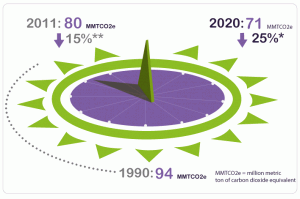What is Massachusetts’ Progress towards Reducing Greenhouse Gas (GHG) Emissions by 2020?
 After the record breaking winter New England has suffered, and the historical drought California is currently enduring, it has many wondering, “Is this global warming taking effect?” While there is a lot of debate on the topic, the Commonwealth of Massachusetts is in full swing trying to reduce our Co2 emissions.
After the record breaking winter New England has suffered, and the historical drought California is currently enduring, it has many wondering, “Is this global warming taking effect?” While there is a lot of debate on the topic, the Commonwealth of Massachusetts is in full swing trying to reduce our Co2 emissions.
The Global Warming Solutions Act was signed in August of 2008 to come up with solutions that will dramatically reduce heat trapping emissions. It is believed this plan will give us a decent chance at avoiding the worst effects of global warming. The plan is to reach a target of 25% reduction of GHG emissions by 2020 and 80% by 2050. The Department of Energy and Environmental Affairs and Energy has made an interactive publication available on its website to bring light to this plan. In the article they discuss the following topics;
- Massachusetts Climate & Energy Progress
- The Greatest Contributors to Green House Gas Emissions
- Greenhouse Gas Emissions by Sector ( 1990 – 2012)
- The Largest GHG Sources in Massachusetts
- Massachusetts Electric Power Sector Fuel Use
- How Energy Efficiency Benefits are growing over time
- Massachusetts Renewable Energy New Generation is on the Rise
- Travel on Massachusetts Highways Increases and Levels
- Transportation Sector Fuel Consumption
- State Mass Transit Ridership is Slowly Rising
To learn more about Massachusetts’ plan to reduce GHG emissions visit the article using this link;
Let Petroleum Management Services Inc. and Lighthouse Environmental Solutions help your company stay compliant with new and changing environmental regulations and laws. Give us a call for more information on compliance consultation at 781-245-3305.